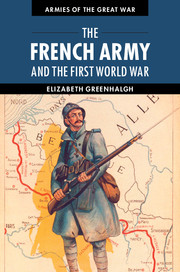Book contents
- Frontmatter
- Contents
- List of figures
- List of maps
- List of tables
- Preface
- List of abbreviations
- Introduction
- 1 The pre-war Army
- 2 1914: From the frontiers to Flanders
- 3 1915: On the offensive
- 4 1916: Verdun and the Somme
- 5 General Nivelle and his 1917 offensive
- 6 Restoring the Army
- 7 1918: German offensives
- 8 The path to victory
- 9 Armistices and demobilisation
- 10 From 1914 to 1919: Aux armes, citoyens!
- Notes
- Bibliographic essay
- Index
5 - General Nivelle and his 1917 offensive
Published online by Cambridge University Press: 05 November 2014
- Frontmatter
- Contents
- List of figures
- List of maps
- List of tables
- Preface
- List of abbreviations
- Introduction
- 1 The pre-war Army
- 2 1914: From the frontiers to Flanders
- 3 1915: On the offensive
- 4 1916: Verdun and the Somme
- 5 General Nivelle and his 1917 offensive
- 6 Restoring the Army
- 7 1918: German offensives
- 8 The path to victory
- 9 Armistices and demobilisation
- 10 From 1914 to 1919: Aux armes, citoyens!
- Notes
- Bibliographic essay
- Index
Summary
The general chosen to replace Joffre is the only man with a Western Front battle named after him. Joffre had preferred Robert Nivelle to the cautious and demanding Pétain of May 1916 at Verdun, and he recommended Nivelle to Briand. Since Briand was expecting Joffre still to play a role as the government’s ‘technical advisor’, it seemed prudent that Joffre and the new CinC should be able to work together. Furthermore, Poincaré much preferred the Joffre–Nivelle strategy of seeking the decisive battle in 1917, with the aim of capturing strategic German territory, over anything the other candidate, Pétain, might propose. Briand knew that Pétain would not work willingly with Joffre; moreover, Pétain favoured small, local actions with limited aims. Briand wanted a ‘new spirit’ in his rejigged cabinet and favoured Nivelle as being more likely to infuse the high command in similar manner. Besides, Pétain was not acceptable politically. He had insulted Poincaré by saying ‘we are neither commanded nor governed’, and suggested that the head of state should act as a dictator to get things moving. When Poincaré exclaimed, ‘but what about the Constitution?’, Pétain replied ‘bugger the Constitution’. Yet his dislike of Pétain’s politics was probably a less important factor in Poincaré’s eyes than his wish for Nivelle’s more aggressive attitude. See Figure 11.
- Type
- Chapter
- Information
- The French Army and the First World War , pp. 170 - 219Publisher: Cambridge University PressPrint publication year: 2014
Accessibility information
- 1
- Cited by

